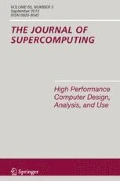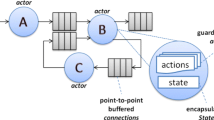Abstract
Reconfigurable architectures such as FPGAs are flexible alternatives to DSPs or ASICs used in mobile devices for which energy is a key performance metric. Reconfigurable architectures offer several design parameters such as operating frequency, precision, amount of memory, degree of parallelism, etc. These parameters define a large design space that must be explored to find energy-efficient solutions. It is also challenging to predict the energy variation at the early design phases when a design is modified at algorithm level. Efficient traversal of such a large design space requires high-level modeling to facilitate rapid estimation of system-wide energy. However, FPGAs do not exhibit a high-level structure like, for example, a RISC processor for which high-level as well as low-level energy models are available. To address this scenario, we propose a domain-specific modeling technique for energy-efficient kernel design that exploits the knowledge of the algorithm and the target architecture family for a given kernel to develop a high-level model. This model captures architecture and algorithm features, parameters affecting energy performance, and power estimation functions based on these parameters. A system-wide energy function is derived based on the power functions and cycle specific power state of each building block of the architecture. This model is used to understand the impact of various parameters on system-wide energy and can be a basis for the design of energy-efficient algorithms. Our high-level model is used to quickly obtain fairly accurate estimate of the system-wide energy dissipation of data paths configured using FPGAs. We demonstrate our modeling methodology by applying it to four domains.
Similar content being viewed by others
References
A. Bogliolo, L. Benini, and G. Micheli. Regression-based RTL power modeling. ACM Transactions on Design Automation of Electronic Systems, 5(3), 2000.
B. L. Bowerman and R. T. O'Connell. Linear Statistical Models-An Applied Approach, 2nd ed. Brooks/Cole Pub Co., 1990.
S. Choi, J.-W. Jang, S. Mohanty, and V. K. Prasanna. Domain-specific modeling for rapid system-wide energy estimation of reconfigurable architectures. Engineering of Reconfigurable Systems and Algorithms, 2002.
S. Choi, R. Scrofano, and V. K. Prasanna. Energy-efficient design of kernel applications for FPGAs through domain-specific modeling. 5th annual Military and Aerospace Programmable Logic Devices, 2002.
H. ElGindy and Y.-L. Shue. On sparse matrix-vector multiplication with FPGA-based systems. IEEE Symposium on Field Programmable Custom Computing Machines (FCCM), April 2002.
R. Hogg and E. Tanis. Probability and Statistical Inference, 6th ed. Prentice Hall, Upper Saddle River, NJ, pp. 656–657, 2001.
J. W. Hong and H. T. Kung. I/O complexity: The red-blue pebbling game. ACM Symposium on Theory of Computing (STOC), 1981.
J. Jang, S. Choi, and V. K. Prasanna. Energy-efficient matrix multiplication on FPGAs. International Conference on Field Programmable Logic and Applications, 2002.
P. Master and P. M. Athanas. Reconfigurable computing offers options for 3G. Wireless Systems Design, 1999.
S. Mohanty, V. K. Prasanna, S. Neema, and J. Davis. Rapid design space exploration of heterogeneous embedded systems using symbolic search and multi-granular simulation. Language Compilers and Tools for Embedded Systems, 2002.
S. Mohanty, S. Choi, J. Jang, and V. K. Prasanna. A model-based methodology for application specific energy efficient data path design using FPGAs. IEEE International Conference on Application-Specific Systems, Architectures and Processors, 2002.
T. Mudge. Power: A first-class architectural design constraint. IEEE Computer, 34(4), April 2001.
A. V. Oppenheim and R. W. Schafer. Discrete-Time Signal Processing, Prentice Hall, Englewood Cliffs, NJ, 1989.
V. K. Prasanna Kumar and Y. Tsai. On synthesizing optimal family of linear systolic arrays for matrix multiplication. IEEE Transactions on Computers, 40(6), 1991.
H. Quinn, M. Leeser, and L. S. King. Implementing image processing pipelines in a hardware/software environment. High Performance Embedded Computing Workshop, 2002.
A. Ragunathan, N. K. Jha, and S. Dey. High-level Power Analysis and Optimization, Kluwer Academic Publishers, Norwell, MA, 1998.
R. Scrofano, S. Choi, and V. K. Prasanna. Energy efficiency of FPGAs and programm able processors for matrix multiplication. International Conference on Field-Programmable Technology, 2002.
L. Shang and N. K. Jha. High-level power modeling of CPLDs and FPGAs. International Conference on Computer Design, 2001.
L. Shang, A. Kaviani, and K. Bathala. Dynamic power consumption in Virtex-II FPGA family. International Symposium on Field Programmable Gate Arrays, 2002.
A. Stammermann, L. Kruse, W. Nebel, and A. Prastsch. System level optimization and design space exploration for low power. International Symposium on System Simulation, 2001.
H. Styles and W. Luk. Customising graphics application: Techniques and programming interface. IEEE Symposium on Field Programmable Custom Computing Machines (FCCM), 2000.
Xilinx Inc. Xilinx Application Note: Virtex-II Series and Xilinx ISE 4.1i Design Environment. http://www.xilinx.com.
G. Yeap, Practical Low Power Digital VLSI Design, Kluwer Academic Publishers, Norwell, MA, 1998.
Author information
Authors and Affiliations
Rights and permissions
About this article
Cite this article
Choi, S., Jang, Jw., Mohanty, S. et al. Domain-Specific Modeling for Rapid Energy Estimation of Reconfigurable Architectures. The Journal of Supercomputing 26, 259–281 (2003). https://doi.org/10.1023/A:1025647031327
Issue Date:
DOI: https://doi.org/10.1023/A:1025647031327




